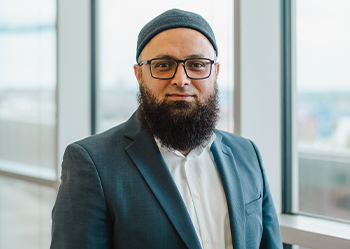University News Last updated 23 July 2024

Operating on a patient’s digital twin prior to actual surgery could help revolutionise complex cancer care, says a leading artificial intelligence expert at ̽��ֱ�� (BCU).
Professor Muhammad Bilal��believes the technological advancement will allow surgeons to be fully prepared when an individual eventually goes under the knife.��
“We’re a way off from robotic platforms conducting operations autonomously, but the technological advancements in visual computing and data integrations are the foundational steps as we tread into an increasingly advanced digital future,” said Professor Bilal.��
“In the future, a surgeon will be able to understand complex patient anatomy preoperatively, navigate potential operative hurdles, and even perform a virtual mock the entire operation on a digital twin in VR before operating on the patient.”��
Professor Bilal, who has considerable experience in developing and integrating technology in a wide range of ecosystems,��is working alongside colleagues at (UHB) to lead advances in cancer care.��
“By digitalising the clinical workflow, we can improve patient safety, enhance productivity and efficiency, and provide superior care delivery for patients,” said the Professor of Applied Artificial Intelligence and Technology Ethics at BCU.��
“We want to create impactful digital technologies that make data easier to integrate, analyse and interpret for healthcare professionals, facilitating critical decision-making.”����
Dr Shazad Ashraf, a bowel cancer surgeon at UHB working with Professor Bilal, says��digital solutions can be extremely beneficial for complex��cancer care.��
“Efficient, secure, and rapid data flow from primary to secondary care can be particularly challenging, especially when multiple investigation modalities are required to determine whether a patient has cancer,” said Dr Ashraf.��
“Processing large numbers of urgent referrals is also a significant problem. With a catchment of two million people, we face a significant pressure on local diagnostic services.��
“In a typical large hospital cancer meeting, we discuss between 30-50 patients in two hours, giving us only a few minutes per patient to plan their treatment and make high-stake decisions.��
“Digital solutions that can assess large patient datasets to identify and track potential cancer patients quickly would be of huge benefit.”��
Professor Bilal’s team has already created��SwiftCare, a prototype designed to��stratify cancer risk in primary care��and��automatically��complete��referral forms to��reduce processing times.��
The project��has received £40,000 from NHS England for this early phase research.��
“Our top priority in the NHS is to apply digital technology to solve real-world problems,” said Dr Ashraf. “We aim to grow and foster this kind of collaboration with BCU.”��